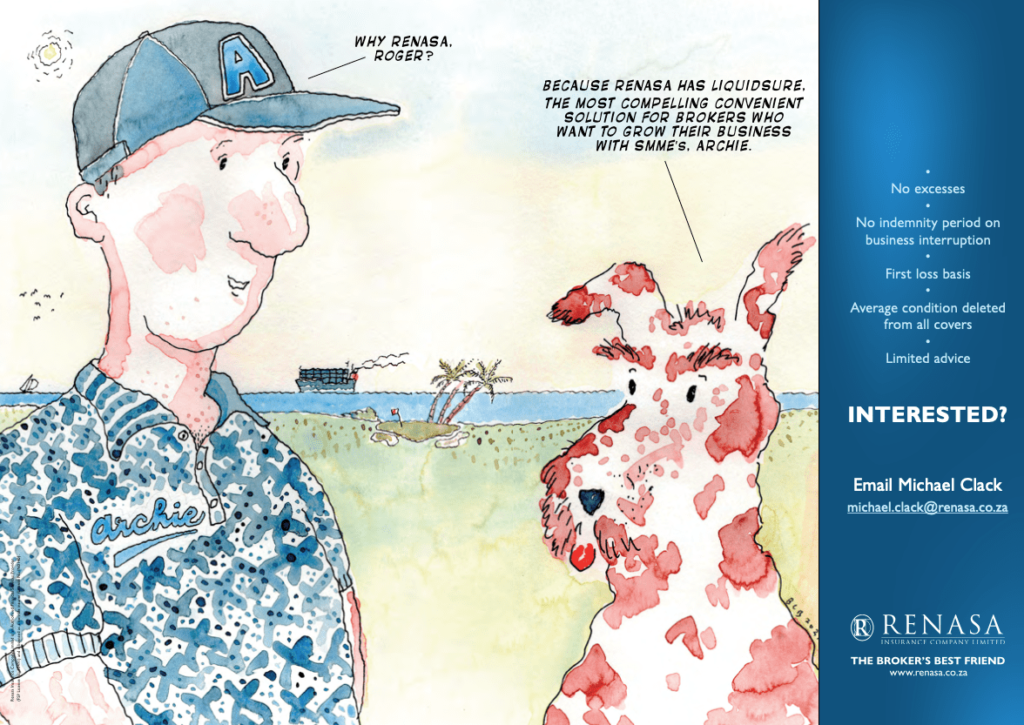
With the fourth wave of COVID Still hanging over us in middle December, I spent some time with Jonathan Rosenberg, the CEO of Renasa Insurance, looking back at 2021 with its economic challenges and social unrest, asking him for his perspectives and his thoughts for the future.
Jonathan kicked off the conversation by saying how he enjoys being able to work from the office again, after 20 months of remote working, despite the fact that Renasa operated efficiently in that remote environment. “While settling well north of R2b in claims over this period, I don’t think I have had five complaints in respect of more than five of those claims, which leaves me comfortable with the fact that our staff embraced the remote working situation well and they were productive”.
He did however say that he feels that communication, in a remote environment, is just not the same and that much is lost from an interpersonal point of view. Jonathan thinks, as a result, in one way or other, relationships have suffered, and he thinks that this pandemic, this disaster, has left both people and businesses damaged. “I think there’s going to be a new normal, which I don’t think will ever mirror what existed before, but hopefully, will be a hybrid of what we had before and what we experienced during the height of the pandemic pre vaccination era”, he said.
Jonathan said that he looks forward, in this new environment, to renewing the relationships which have been restricted to Teams and Zoom meetings alone for the past 20 months, and he looks forward to the undoing of all that’s wrong with the remote method of operation. However, he stressed: “I’m very grateful that we had the opportunity to work remotely, for an extended period like that, and I think it has contributed to keeping our staff safe in the way we have, so we haven’t lost anyone. I’m very grateful for that and consider us very fortunate. But in terms of our way of doing business and how we operate, I think that the environment generally is damaging to interpersonal communications”.
How I have come to know Renasa over the past 16 years is that the insurer is very much a personal relationship business, with brokers as the exclusive distribution channel. I asked Jonathan how he thinks the broker environment adapted to all this, considering his views expressed above.
According to him, the whole system seems to have operated almost in a seamless fashion. Policies were renewed, premium was collected, claims were initiated and claims were paid. He mentioned that he has just come from a meeting with a broker who said that they’ve grown through the period and that Renasa itself continued growing, even experiencing renewed growth now. He said they had, in the early stages of the pandemic, a significant fall off in premium, which took maybe five months to recover. They were then stable for a few months, before growth resumed.
This, he said, came about through no special effort in terms of external marketing initiatives, other than what is done through industry media, such as COVER. With no events of any description, very few visits to brokers and the like, they still managed to maintain what was entrenched and cemented before and, as business recovers now, they see the benefits in this renewed growth.
The lasting effect – Jonathan is of the opinion that there will be significant, lasting changes for the insurance industry, and especially brokers, after these two years. “I think it applies to all business, not just the insurance space. So, I think everyone is going to adapt to the new normal. On routes, like the Pretoria/Johannesburg highway, we may see levels of traffic like what was experienced previously, but I certainly don’t experience the same levels of traffic on the way in or on the way home at night”. He said that, to him, it seems that much of the world must still be operating remotely, and that they are returning on a rotational basis, observing all the necessary COVID protocols of social distancing, which means that we are unlikely any time soon to have an entire complement at work at the same time. He sees the world operating in this fashion until such time as the scourge has been licked, if it indeed it can be licked. He hoped that scientific progress is going to be on our side and said that the impact of the pandemic has been tantamount to that of a war, not human on human, but with the same sort of fallout, in many respects. It has the same psychological impact, same fears and same damage, as a war.
He said: “So, yes, I don’t think this is not going to leave the world untouched and I don’t think it will ever be the same. I think there will be a new normal that might approximate more closely what we had before but I don’t believe it will ever be the same”.
I then asked him to, with his insurance industry hat on, share what lessons we should take from this period? Said Jonathan: “The industry has been under criticism on several occasions throughout this period and I think that the industry can be justly proud of how it acquitted itself. It operated largely without skipping a beat and it bore the brunt of enormous pressure and criticism, which I believe, was unfairly levelled. I think, if we as an industry continue to perform to that standard, then the industry will continue to deliver, it will continue to perform as it has and, economic circumstances permitting, we will see some welcome growth again”.
On the subject of the need for advice on risk, risk management and risk mitigation, which have really come to the fore and on which they could capitalise on as an insurer, Jonathan had the following to say: “We’ve had many years of striking growth, growing for 13 years preceding the pandemic, at a compound growth rate of something like 26%. It was a strategy of ours to grow at pace to achieve critical mass. So, following those years of strides and growth, our focus for the next while will be on quality rather than quantity and on doing what we’ve been found to be good at, which is delivering to intermediaries in the outsource segment of the market what they value”.
This, according to him, is access to decision makers, quick decisions, and a service level which helps them to outcompete their own competitors. That is therefore what they are going to focus on. They will continue to employ, technology to support the personal service that Renasa delivers and give to their brokers, and they will continue developing their popular technology. He said they will also continue to extend their reach, wherever it’s appropriate.
In conclusion, Jonathan confirmed: “As part of this, we have started planning a new branch, believe it or not. That would seem to go against the grain of how business is being done now, with everything being centralized, especially since you can operate remotely and people are closing branches rather than expanding. But, for us, our relationships run deep into the communities we service.
So, local presence is important and we prefer delivering our brand of personal service through that local presence, supported by technology, rather than simply using technology as replacement”.


